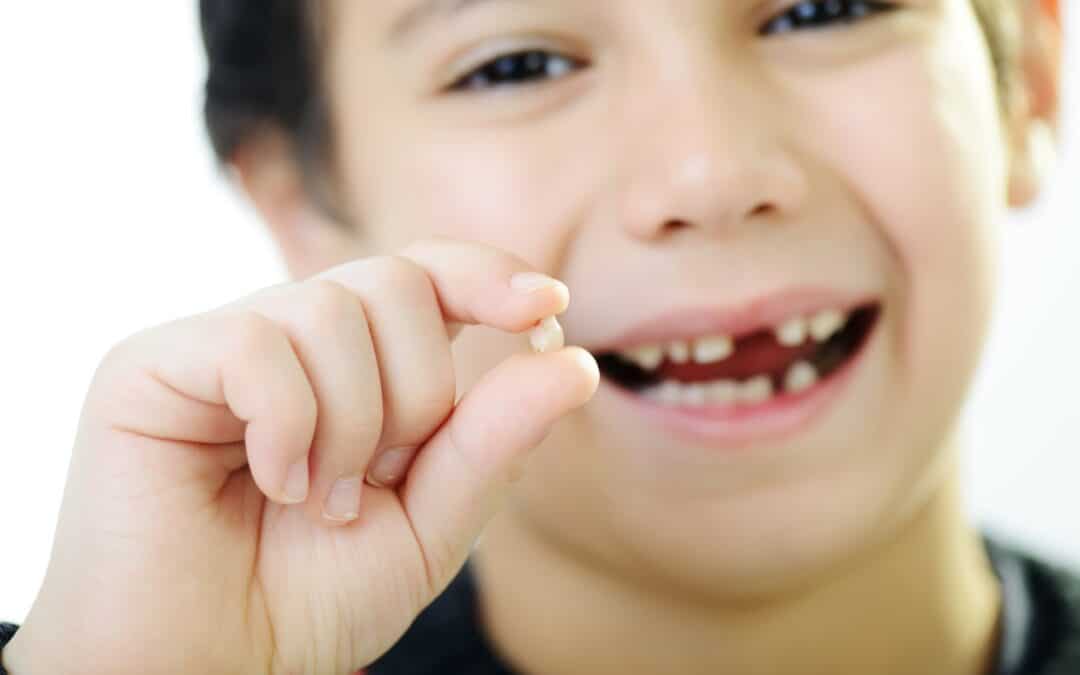Did you know that the first teeth to appear on a baby are usually the front bottom teeth (otherwise known as the incisors)? As a parent, this likely fascinates you.
After all, kids grow and develop, it’s hard not to be enamored with their milestones from the moment they roll over for the first time to when they start losing teeth to make room for their adult teeth (it all happens so fast).
But many parents wonder when exactly do those pearly whites start falling out to make way for adult teeth? From age guidelines to toothless grins and all of the gaps in between, here’s what you need to know about your child’s journey into losing teeth.
When Should Baby Teeth Come In?
Before we dive into losing teeth, let’s go back a bit. When should your child’s teeth start to come in? Generally, baby teeth, or primary teeth, will start to appear in a baby’s mouth around six months old. However, in some babies, this doesn’t happen until around month 10.
Their teeth will likely continue to erupt until the baby is around two years old. What can you expect in between, though? They’ll likely have between six to ten teeth visible by their first birthday. Most children should have their full set of 20 baby teeth by the time they are three.
Understanding this timeline is part of monitoring their dental wellness. It’s important to monitor their tooth development and also prepare yourself for childcare dental appointments as young as 12 to 18 months old to ensure healthy baby teeth overall.
When Do Kids Start Losing Teeth?
Now, when do kids start losing their teeth? Most kids start losing their baby teeth around the age of 6 and continue losing them until sometime around age 12. During this time, children tend to develop an extra helpful tooth fairy who rewards the child for parting ways with each tooth.
Losing a tooth can be scary at first, but with parents and siblings involved, losing teeth can become a regular rite of passage in many homes. It’s a special moment when it’s time to say farewell to those little pearly whites! And, it’s a normal part of healthy oral development and overall just a part of growing up.
What can you expect in terms of which teeth they lose and how quickly? Here’s a helpful breakdown.
Center Teeth
The center teeth are also called their bottom and top incisors. Typically, you’ll find that most children lose their incisors first. This is why you see most kids around the age of fix, six, or seven with two or even four front teeth missing at the same time.
However, it’s important to keep in mind that this might not be the case. Everybody’s mouth is different. Likewise, some kids don’t lose these central incisors until the age of eight. If you’re worried about your child’s teeth loss timeline then going to the dentist for a checkup is a great way to get a gauge of what’s going on underneath their gums.
Sharp Teeth
The sharp teeth we often call eye teeth (due to their position under the eyes on your face) are technically referred to as canines. After losing their central incisors, children often go on to lose their upper canines. This is followed by their lower canines and their first molars.
Most children don’t lose these teeth until about nine years old. However, some don’t lose their molars until the age of 12. Again, it’s different for everybody so the best way to understand what’s “normal” for your child is to take them in for a dentist’s appointment!
Molars
Finally, the second molars in the back are usually the last to go. You can expect your child to lose their back molars between 10 to 12 years old.
How Many Baby Teeth Do Kids Lose?
So, all in all, how many baby teeth do kids lose? As mentioned, most children will lose their first tooth around the age of five or six. Generally, it takes about two to three years for all 20 baby teeth to be completely lost and for the next set of adult teeth to start coming in.
Losing all these teeth is a rite of passage for children, as it serves as a reminder that they are growing up. After losing all 20 baby teeth, there will be 32 permanent ones in total, with 4 more wisdom teeth occasionally appearing later on in life.
How to Prepare for the First Loose Tooth
Getting your child ready for their first loose tooth is filled with anticipation and excitement. It’s the first time they will have experienced something like this and it can be a bit of a surprise! Before the first loose tooth appears, brushing, flossing, and teaching your child to eat healthily are key steps to ensuring their first childhood milestone goes smoothly.
Helping them be prepared also includes packing oral hygiene supplies in case the first tooth falls away while they’re out of the house. Having all these things set up ahead of time will make it easier when their first loose tooth comes and keep their smile healthy!
Dental Wellness Tips for Baby Teeth
One common misconception we see from a lot of parents is that they don’t need to encourage their children to brush their baby teeth frequently because they’ll just lose them anyway. This couldn’t be further from the truth! Teaching your little one good dental habits is essential for keeping their baby teeth healthy and setting them up for lifelong oral health.
Start with a soft baby toothbrush, and brush your babys teeth gently with water or a low-fluoride toothpaste once in the morning and again before bed. As soon as their teeth start to touch, begin flossing between babys teeth daily. It helps to practice brushing on a toy so your baby can get used to the feeling of having something inside their mouth.
Make sure your child receives regular checkups from the dentist to spot any concerns early. Ultimately, small habits such as teaching your child how to drink from an open cup instead of using a bottle as they grow older also help establish good oral hygiene and minimize potential problems in the future.
Looking for a Pediatric Dentist in Kentucky?
Our pediatric dentist in Kentucky is here to ensure your childs dental health! We provide quality pediatric care from the comfort of our office where we offer dentistry services for children of all ages, ranging from infants to adolescents.
We strive to provide a safe and comfortable experience while offering helpful tips to help maintain healthy teeth and gums. Whether you have questions about your child losing teeth or think they need a checkup or braces, we’re ready to welcome you to one
Schedule an appointment with us at your earliest convenience. We look forward to seeing you soon!


Recent Comments